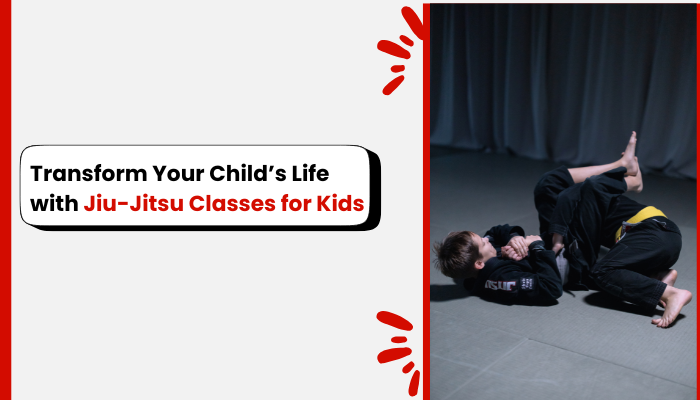In a world where screen time often trumps physical play, many parents are seeking engaging ways to nurture their child’s growth, both mentally and physically. Jiu-jitsu classes for kids offer a holistic approach to fitness, self-discipline, and confidence-building, making it a perfect extracurricular activity for children of all ages.
Unlike many other sports, jiu-jitsu blends physical exercise with problem-solving skills in a safe, fun environment. Whether your child is naturally athletic or simply needs a confidence boost, stepping onto the mats could be the life-changing experience they need.
The Unique Benefits of Jiu-Jitsu Classes for Kids
Jiu-jitsu stands out from other martial arts because it focuses on leverage and technique rather than brute strength. This aspect alone makes it highly suitable for children, teaching them that success often comes from strategy and persistence rather than physical dominance. Let’s explore some of the top benefits your child can gain from participating in jiu-jitsu classes for kids.
Build Confidence and Self-Esteem Through Jiu-Jitsu
Children often struggle with self-confidence, especially in social or competitive settings. Jiu-jitsu provides a structured, supportive environment where kids can develop a positive self-image. Every skill they master, from basic grappling moves to complex submissions, reinforces their belief in their abilities. Unlike traditional team sports, where performance depends on collective effort, jiu-jitsu encourages individual growth.
In jiu-jitsu classes for kids, instructors emphasize personal progress rather than comparison to others. Small victories, like escaping from a pin or applying a technique correctly, build incremental self-esteem. Over time, even the most timid children begin to carry themselves with newfound confidence both on and off the mats.
Instilling Discipline and Focus in Young Minds
Jiu-jitsu requires a high level of concentration and self-discipline. Each session demands focus, as students must listen carefully to their instructors, observe demonstrations, and practice techniques repeatedly.
For kids, these habits translate into improved behavior and attention in school, better time management, and a greater ability to handle frustration.
Many parents report seeing positive changes in their children’s ability to concentrate and stay motivated after enrolling in jiu-jitsu classes for kids. The step-by-step learning process fosters patience, persistence, and a growth mindset — invaluable skills that extend far beyond the dojo.
Learning Respect and Humility in a Safe Environment
One of the core tenets of martial arts is respect — respect for instructors, fellow students, and the art itself. In jiu-jitsu classes, kids quickly learn that respect is non-negotiable. Bowing before entering the mats, showing gratitude after sparring, and helping peers refine techniques are all part of the culture. This emphasis on respect teaches children to appreciate their opponents, understand the value of teamwork, and remain humble in both victory and defeat.
Equally important, jiu-jitsu classes for kids offer a controlled environment where instructors prioritize safety. Unlike rough playground interactions, grappling on the mats under professional supervision minimizes risk. Children learn how to apply techniques responsibly and how to tap out when they need to submit, ensuring they develop a healthy understanding of boundaries and consent.
A Fun and Effective Way to Improve Physical Fitness
Getting kids to stay active in an era of digital distractions can be challenging, but jiu-jitsu makes exercise exciting. Rolling on the mats, practicing drills, and engaging in live sparring sessions are dynamic activities that improve cardiovascular endurance, strength, flexibility, and coordination. Unlike monotonous gym routines, jiu-jitsu offers variety and unpredictability, keeping children motivated to return to class.
In addition, jiu-jitsu classes for kids are tailored to different age groups and skill levels, ensuring that training remains age-appropriate and engaging. The combination of aerobic and anaerobic activity provides a full-body workout that builds strong, agile bodies. Over time, kids develop healthier habits, better posture, and increased stamina — all while having fun.
Teaching Problem-Solving and Critical Thinking Skills
Jiu-jitsu is often described as “human chess” due to its emphasis on strategy. Each roll presents a unique puzzle for practitioners to solve. How do you escape a chokehold? What’s the best way to counter your opponent’s grip? Kids learn to think critically and adapt their techniques based on real-time feedback. These problem-solving skills foster creativity and improve decision-making in everyday situations.
In jiu-jitsu classes for kids, instructors encourage students to experiment and learn from mistakes. Unlike activities where failure feels punitive, jiu-jitsu reframes failure as part of the learning process. This mindset shift helps children become more resilient, teaching them to analyze setbacks constructively rather than feeling defeated.
Self-Defense Skills That Prioritize Safety and Non-Violence
Bullying remains a major concern for parents, and many seek martial arts training to equip their children with self-defense skills. However, jiu-jitsu’s approach to self-defense is unique. It emphasizes control, leverage, and de-escalation rather than striking or aggression. Kids learn how to neutralize threats without causing harm — an invaluable skill in situations where physical confrontation is unavoidable.
Because it relies on technique rather than strength, even smaller children can defend themselves effectively. In jiu-jitsu classes for kids, young practitioners gain confidence in their ability to handle conflict while also understanding that physical force should always be a last resort.
Fostering a Supportive Community and Lifelong Friendships
One of the most overlooked but powerful benefits of jiu-jitsu is the sense of community it fosters. Jiu-jitsu academies create a welcoming, family-like atmosphere where children from diverse backgrounds come together. The camaraderie built through training sessions, sparring matches, and tournaments often leads to lasting friendships.
In jiu-jitsu classes for kids, older or more experienced students often mentor younger ones, promoting a culture of mutual support. This environment helps children develop empathy, teamwork, and leadership skills — qualities that will serve them well throughout life.
Choosing the Right Jiu-Jitsu School for Your Child
Selecting a quality jiu-jitsu school is crucial to ensuring a positive experience for your child. Look for academies with certified instructors who specialize in working with children. A welcoming atmosphere, clean facilities, and a well-structured curriculum are all important factors to consider. Additionally, attending a free trial class or observing a session can help you gauge whether the school’s teaching style aligns with your child’s learning needs.
Many academies offer flexible schedules for jiu-jitsu classes for kids, allowing you to find a program that fits into your family’s routine. Be sure to ask about safety protocols, student-to-instructor ratios, and opportunities for progression and belt promotion.
In Ending
Enrolling your child in jiu-jitsu classes for kids can transform their life in profound ways. From building confidence and discipline to enhancing physical fitness and problem-solving skills, jiu-jitsu offers a well-rounded approach to personal growth.
By providing a safe and supportive environment, this martial art empowers children with valuable life skills that extend far beyond the mats. Don’t wait — give your child the gift of resilience, respect, and lasting friendships with the power of jiu-jitsu.
If You are reading more information read this article also- Top Physical and Mental Benefits of Wrestling Lessons for Adults



